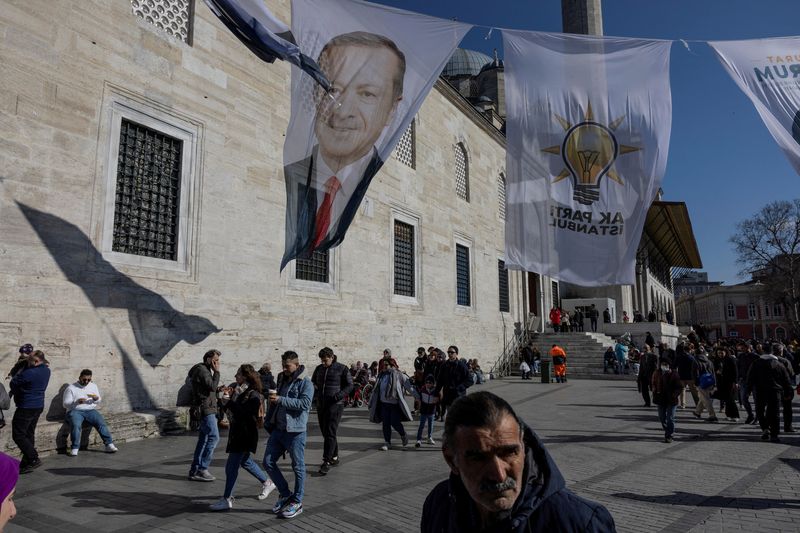By Ebru Tuncay, Birsen Altayli and Jonathan Spicer
ISTANBUL (Reuters) - Turkey is expected to take more policy steps to cool stubbornly high inflation after this month's local elections, setting the stage for more pain for Turks already struggling after years of soaring prices, according to data and some economists.
Households and investors appear sceptical over whether the central bank's dramatic U-turn towards massive interest rate hikes - to 45% now from 8.5% last June - is sufficient on its own to rein in inflation that topped 67% last month.
Finance Minister Mehmet Simsek and other authorities have urged patience, saying the more orthodox set of policies adopted last year would bring price relief later this year.
Simsek said on Monday that he does not plan big tax changes, while the central bank has said it would hike rates more if inflation drifts above forecasts in the months ahead.
Yet the higher-than-expected February inflation data, combined with persistently high domestic demand has raised expectations that more fiscal and monetary steps are coming - though not until after March 31 elections for which President Tayyip Erdogan is campaigning hard for his ruling AK Party.
"Once the local election cycle is over the monetary and fiscal policies will likely tighten again after a brief pause," said Selva Demiralp, professor at Istanbul's Koc University and a former Federal Reserve economist.
"By mid-year, we will taste the full bitterness of the policy medicine," she said. "Inflation will rise until at least then, while hikes to the minimum wage and other fiscal buffers will dissipate."
Among efforts to ease the dual sting of high inflation and borrowing costs, Ankara has hiked the minimum wage by 49% this year.
Some prominent economists say that if it wants to cut inflation to 36% by year-end as the central bank forecasts, such fiscal measures need to halt. Wall Street bank JPMorgan (NYSE:JPM) expects a 500 basis-point rate hike in April.
DISTRUST
Consumers, faced with an 8.25% rise in food and non-alcoholic drink prices from January to February alone, see little relief on the horizon.
"My husband and I do not think inflation will decrease rapidly," said Gulsah, 34, a maths teacher at an Istanbul high school who declined to give a surname.
"We try to keep savings in foreign currencies and gold to protect ourselves" because, she said, "we still can't trust" that the lira will remain stable after the elections.
Worried about inflation, Gulsah said she bought a pressure cooker that her family didn't really need in November just because she thought its price would double or triple this year.
Some 92% of households said it was a good time to buy appliances, electronics and other durable goods based on a Koc University Household Inflation Expectations survey of more than 2,500 respondents last month with Konda research firm.
The data, not yet published, reflects deep pessimism that inflation will fall after a years-long cost-of-living crisis, brought on by Erdogan's longstanding opposition to high rates and his ousting of five central bank governors in as many years.
The annual growth rate of credit card spending rose to more than 153% while the total loan growth rate was 52% in the 12 months to January, according to banking watchdog data. Bankers have said the government should take measures to curb credit card spending to cool domestic demand.
'INVISIBLE HAND'
After his re-election last May, Erdogan appointed a new cabinet and central bank leadership to turn things around amid depleted foreign reserves and soaring inflation expectations.
Foreign investors began buying Turkish bonds late last year, seeking to cash in on the rate hikes.
But over the last week the cheer has faded, testing Erdogan's will to address inflation while his AK Party seeks to reclaim Istanbul and other big cities from the opposition in the approaching elections.
The lira tumbled to new lows beyond 31.8 to the dollar this week, 10-year bond yields returned to November levels and Turkey's credit default swaps, a measure of risk, jumped to 330 basis points, the highest in a month.
Gizem Oztok Altinsac, chief economist for Turkey's largest business group TUSIAD, said annual inflation will fall after May due to base effects but not as much as the central bank predicts due to strong domestic demand.
She told an Istanbul summit two weeks ago that rates were not hiked high enough when the tightening began last summer and that despite the election tight fiscal policy needs to buffet monetary policy in order to tackle inflation.
"Steps should be taken on time," Altinsac said.
Hakan Kara, the central bank's former chief economist and a professor at Bilkent University, told the summit: "An invisible hand ensures a tightness level just below optimum whenever the central bank is about to reach optimum policy tightness."

A Reuters poll sees annual inflation falling to 42.7% by year-end, higher than the central bank forecast.
Simsek, speaking on local broadcaster BloombergHT this week, said that inflation would remain high in the coming months due to base effects and the delayed impact of rate hikes, but would fall in the next 12 months. (This story has been corrected to remove reference to Selva Demiralp's view on fiscal measures in paragraph 9)